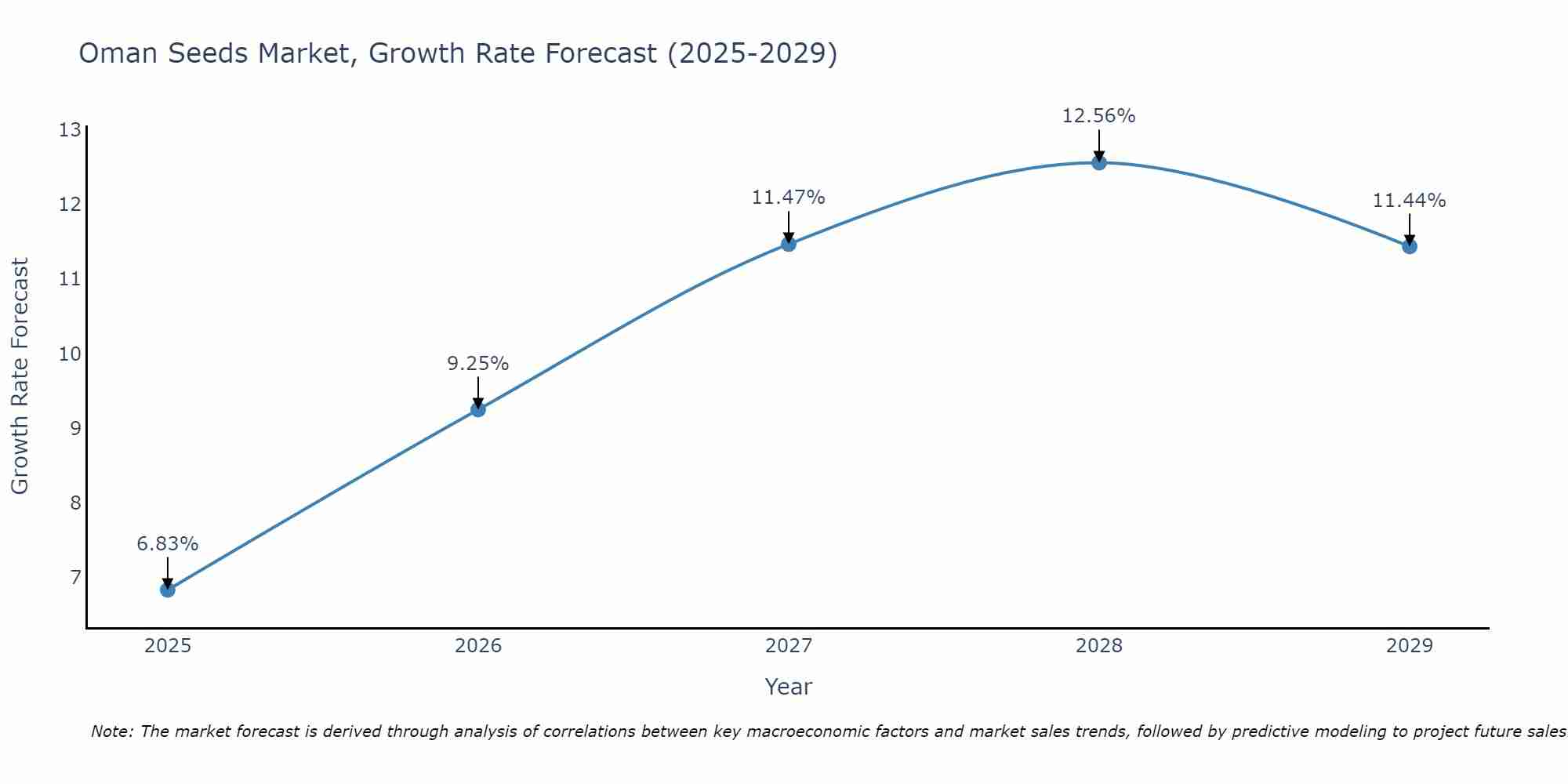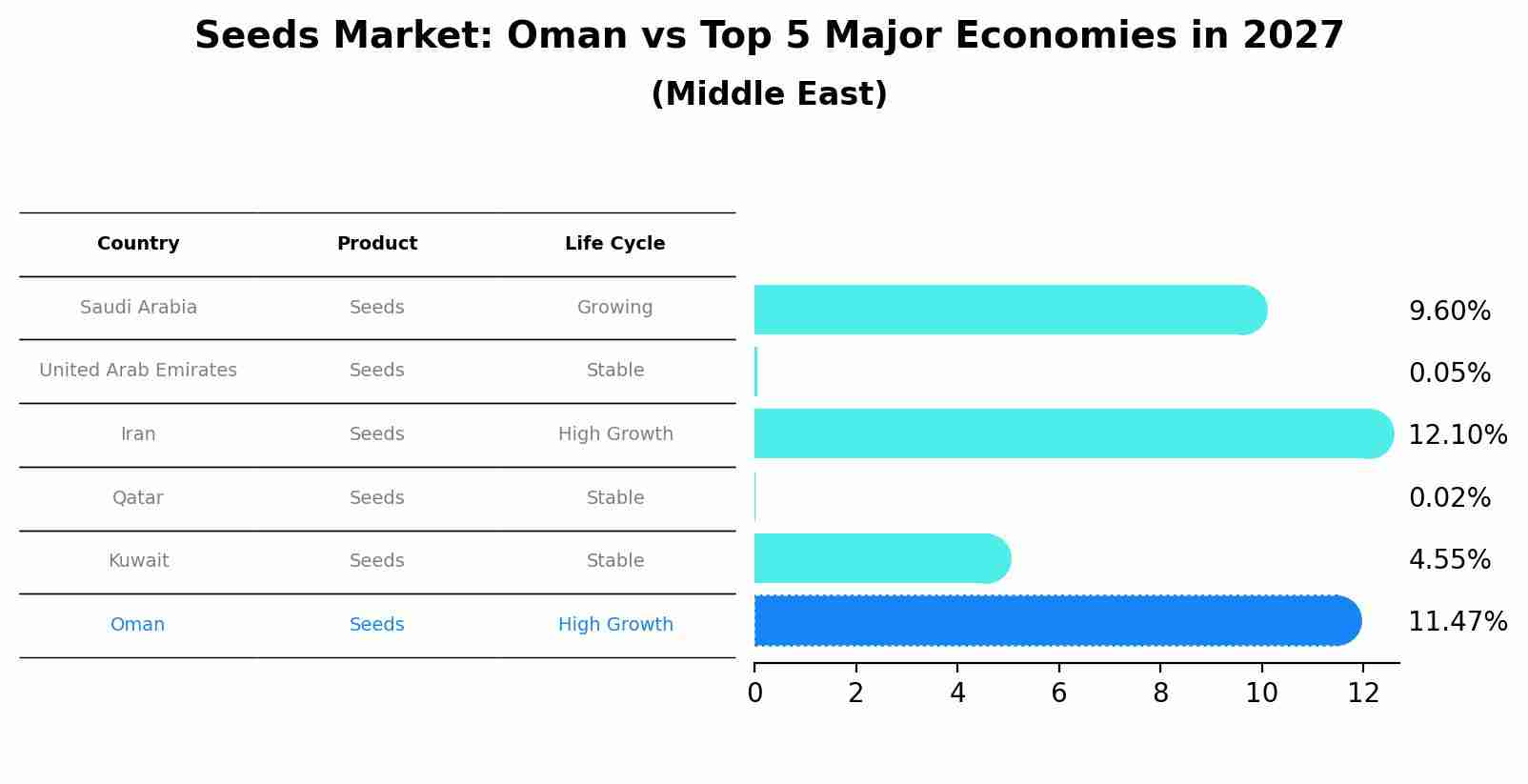Oman Seeds Market Outlook | Share, Revenue, Industry, Trends, Growth, Value, Analysis, COVID-19 IMPACT, Size, Forecast & Companies
| Product Code: ETC384703 | Publication Date: Aug 2022 | Updated Date: Jul 2025 | Product Type: Market Research Report | |
| Publisher: 6Wresearch | Author: Shubham Deep | No. of Pages: 75 | No. of Figures: 35 | No. of Tables: 20 |
Oman Seeds Market Size Growth Rate
The Oman Seeds Market is projected to witness mixed growth rate patterns during 2025 to 2029. The growth rate begins at 6.83% in 2025, climbs to a high of 12.56% in 2028, and moderates to 11.44% by 2029.

Seeds Market: Oman vs Top 5 Major Economies in 2027 (Middle East)
In the Middle East region, the Seeds market in Oman is projected to expand at a high growth rate of 11.47% by 2027. The largest economy is Saudi Arabia, followed by United Arab Emirates, Iran, Qatar and Kuwait.

Oman Seeds Market Synopsis
The Oman Seeds Market is a growing sector driven by increasing awareness about sustainable agriculture practices. The market offers a wide range of seeds including cereals, pulses, oilseeds, vegetables, and fruits, catering to both commercial farmers and home gardeners. Key players in the market are focusing on developing high-yielding, disease-resistant seed varieties to meet the evolving needs of farmers in Oman. The government`s initiatives to promote agriculture and provide subsidies for farmers are further boosting the demand for quality seeds in the country. With a favorable climate for agriculture and a growing emphasis on food security, the Oman Seeds Market is expected to witness steady growth in the coming years, presenting opportunities for both domestic and international seed companies to expand their presence in the market.
Oman Seeds Market Trends
The Oman Seeds Market is witnessing a growing demand for organic and non-GMO seeds as consumers are increasingly prioritizing health and sustainability. Farmers are also showing a preference for high-yielding and disease-resistant seeds to improve crop productivity and resilience to climate change. Additionally, there is a rising interest in indigenous and locally adapted seed varieties to preserve biodiversity and support traditional agriculture practices. The market is seeing a shift towards more advanced technologies in seed production and breeding techniques to meet the evolving needs of farmers. Government initiatives promoting seed research and development, along with collaborations between seed companies and research institutions, are further driving innovation in the Oman Seeds Market.
Oman Seeds Market Challenges
In the Oman Seeds Market, some of the key challenges faced include limited availability of high-quality seeds, lack of awareness among farmers about modern seed varieties and their benefits, inconsistent government regulations impacting seed imports, and vulnerability to climate change affecting crop production. Additionally, the presence of counterfeit seeds in the market poses a threat to both farmers and seed suppliers, leading to potential crop failures and financial losses. Addressing these challenges will require increased collaboration between government authorities, seed suppliers, and farmers to ensure access to certified seeds, promote education on seed technology, and implement stringent quality control measures to protect the integrity of the seed market in Oman.
Oman Seeds Market Investment Opportunities
The Oman Seeds Market presents promising investment opportunities due to the country`s focus on agriculture and food security. With a growing population and increasing demand for high-quality crops, there is a rising need for improved seed varieties to enhance agricultural productivity. Investors can consider investing in the development and distribution of hybrid or genetically modified seeds tailored to Oman`s climate and soil conditions. Additionally, opportunities exist in seed technology, research, and innovation to introduce advanced farming techniques and sustainable practices. Collaborating with local farmers and agricultural organizations could also prove beneficial in expanding market reach and establishing a strong presence in the Oman Seeds Market. Overall, investing in the Oman Seeds Market offers potential for long-term growth and profitability.
Jordan Agar Market Government Policies
The government policies related to the Oman Seeds Market focus on promoting sustainable agriculture practices, enhancing food security, and supporting local farmers. The Ministry of Agriculture and Fisheries Wealth in Oman implements regulations to ensure the quality and safety of seeds imported into the country. Additionally, the government encourages research and development in the seed sector to improve crop productivity and diversity. Initiatives such as subsidies for purchasing high-quality seeds and training programs for farmers aim to increase the adoption of modern farming techniques and boost overall agricultural productivity in Oman. Overall, the government policies in the Oman Seeds Market are geared towards achieving self-sufficiency in food production and promoting agricultural sustainability.
Oman Seeds Market Future Outlook
The Oman seeds market is poised for steady growth in the coming years, driven by factors such as increasing awareness about the benefits of organic farming, rising demand for high-quality seeds to improve crop productivity, and government initiatives to promote agriculture in the country. The market is expected to witness a shift towards genetically modified seeds and hybrid varieties to meet the growing food demands of a rapidly expanding population. Additionally, technological advancements in seed processing and breeding techniques are likely to enhance the quality and yield of crops, further boosting market growth. With a focus on sustainable agriculture practices and a growing emphasis on food security, the Oman seeds market is anticipated to experience positive growth trends in the foreseeable future.
Key Highlights of the Report:
- Oman Seeds Market Outlook
- Market Size of Oman Seeds Market, 2021
- Forecast of Oman Seeds Market, 2031
- Historical Data and Forecast of Oman Seeds Revenues & Volume for the Period 2018 - 2031
- Oman Seeds Market Trend Evolution
- Oman Seeds Market Drivers and Challenges
- Oman Seeds Price Trends
- Oman Seeds Porter's Five Forces
- Oman Seeds Industry Life Cycle
- Historical Data and Forecast of Oman Seeds Market Revenues & Volume By Type for the Period 2018 - 2031
- Historical Data and Forecast of Oman Seeds Market Revenues & Volume By Genetically Modified (GM) Seed for the Period 2018 - 2031
- Historical Data and Forecast of Oman Seeds Market Revenues & Volume By Conventional Seed for the Period 2018 - 2031
- Historical Data and Forecast of Oman Seeds Market Revenues & Volume By Crop for the Period 2018 - 2031
- Historical Data and Forecast of Oman Seeds Market Revenues & Volume By Field Crops for the Period 2018 - 2031
- Historical Data and Forecast of Oman Seeds Market Revenues & Volume By Fruit & Vegetable Crops for the Period 2018 - 2031
- Historical Data and Forecast of Oman Seeds Market Revenues & Volume By Availability for the Period 2018 - 2031
- Historical Data and Forecast of Oman Seeds Market Revenues & Volume By Commercial Seeds for the Period 2018 - 2031
- Historical Data and Forecast of Oman Seeds Market Revenues & Volume By Saved Seeds for the Period 2018 - 2031
- Historical Data and Forecast of Oman Seeds Market Revenues & Volume By Seed Treatment for the Period 2018 - 2031
- Historical Data and Forecast of Oman Seeds Market Revenues & Volume By Treated for the Period 2018 - 2031
- Historical Data and Forecast of Oman Seeds Market Revenues & Volume By Untreated for the Period 2018 - 2031
- Historical Data and Forecast of Oman Seeds Market Revenues & Volume By Seed Trait for the Period 2018 - 2031
- Historical Data and Forecast of Oman Seeds Market Revenues & Volume By Herbicide Tolerant for the Period 2018 - 2031
- Historical Data and Forecast of Oman Seeds Market Revenues & Volume By Insecticide Resistant for the Period 2018 - 2031
- Historical Data and Forecast of Oman Seeds Market Revenues & Volume By Other Stacked Traits for the Period 2018 - 2031
- Oman Seeds Import Export Trade Statistics
- Market Opportunity Assessment By Type
- Market Opportunity Assessment By Crop
- Market Opportunity Assessment By Availability
- Market Opportunity Assessment By Seed Treatment
- Market Opportunity Assessment By Seed Trait
- Oman Seeds Top Companies Market Share
- Oman Seeds Competitive Benchmarking By Technical and Operational Parameters
- Oman Seeds Company Profiles
- Oman Seeds Key Strategic Recommendations
Frequently Asked Questions About the Market Study (FAQs):
- Single User License$ 1,995
- Department License$ 2,400
- Site License$ 3,120
- Global License$ 3,795
Search
Thought Leadership and Analyst Meet
Our Clients
Related Reports
- Canada Oil and Gas Market (2026-2032) | Share, Segmentation, Value, Industry, Trends, Forecast, Analysis, Size & Revenue, Growth, Competitive Landscape, Outlook, Companies
- Germany Breakfast Food Market (2026-2032) | Industry, Share, Growth, Size, Companies, Value, Analysis, Revenue, Trends, Forecast & Outlook
- Australia Briquette Market (2025-2031) | Growth, Size, Revenue, Forecast, Analysis, Trends, Value, Share, Industry & Companies
- Vietnam System Integrator Market (2025-2031) | Size, Companies, Analysis, Industry, Value, Forecast, Growth, Trends, Revenue & Share
- ASEAN and Thailand Brain Health Supplements Market (2025-2031) | Strategy, Consumer Insights, Analysis, Investment Trends, Opportunities, Growth, Size, Share, Industry, Revenue, Segments, Value, Segmentation, Supply, Forecast, Restraints, Outlook, Competition, Drivers, Trends, Demand, Pricing Analysis, Competitive, Strategic Insights, Companies, Challenges
- ASEAN Bearings Market (2025-2031) | Strategy, Consumer Insights, Analysis, Investment Trends, Opportunities, Growth, Size, Share, Industry, Revenue, Segments, Value, Segmentation, Supply, Forecast, Restraints, Outlook, Competition, Drivers, Trends, Demand, Pricing Analysis, Competitive, Strategic Insights, Companies, Challenges
- Europe Flooring Market (2025-2031) | Outlook, Share, Industry, Trends, Forecast, Companies, Revenue, Size, Analysis, Growth & Value
- Saudi Arabia Manlift Market (2025-2031) | Outlook, Size, Growth, Trends, Companies, Industry, Revenue, Value, Share, Forecast & Analysis
- Uganda Excavator, Crane, and Wheel Loaders Market (2025-2031) | Strategy, Consumer Insights, Analysis, Investment Trends, Opportunities, Growth, Size, Share, Industry, Revenue, Segments, Value, Segmentation, Supply, Forecast, Restraints, Outlook, Competition, Drivers, Trends, Demand, Pricing Analysis, Competitive, Strategic Insights, Companies, Challenges
- Rwanda Excavator, Crane, and Wheel Loaders Market (2025-2031) | Strategy, Consumer Insights, Analysis, Investment Trends, Opportunities, Growth, Size, Share, Industry, Revenue, Segments, Value, Segmentation, Supply, Forecast, Restraints, Outlook, Competition, Drivers, Trends, Demand, Pricing Analysis, Competitive, Strategic Insights, Companies, Challenges
Industry Events and Analyst Meet
Whitepaper
- Middle East & Africa Commercial Security Market Click here to view more.
- Middle East & Africa Fire Safety Systems & Equipment Market Click here to view more.
- GCC Drone Market Click here to view more.
- Middle East Lighting Fixture Market Click here to view more.
- GCC Physical & Perimeter Security Market Click here to view more.
6WResearch In News
- Doha a strategic location for EV manufacturing hub: IPA Qatar
- Demand for luxury TVs surging in the GCC, says Samsung
- Empowering Growth: The Thriving Journey of Bangladesh’s Cable Industry
- Demand for luxury TVs surging in the GCC, says Samsung
- Video call with a traditional healer? Once unthinkable, it’s now common in South Africa
- Intelligent Buildings To Smooth GCC’s Path To Net Zero


















